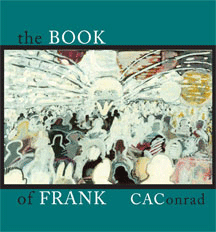
Reading CAConrad’s The Book of Frank I am reminded of Jack Spicer’s remarks about dictation. Especially Spicer’s insistence that the poet is a conduit for messages from an “outside,” and his observation that when one intends to write a poem the poem more often than not comes out in a way entirely different than how the poet intended: "Like if you want to say something about your beloved's eyebrows and the poem says the eyes should fall out, and you don't really want the eyes to fall out or even any vague connection. Or you're trying to write a poem on Vietnam and you write a poem about skating in Vermont."*
That the Frank of The Book of Frank is an extension of Conrad’s life no one acquainted with the poet can have any doubt. And yet Frank is an alter ego at best, if not evidence of what John Keats referred to as a personification of “negative capability." Only whereas Keats' negative capability allows one to remain in uncertainty about their world as an object of the understanding, Conrad's own negative capability is capable of luxuriating in the mysteries of the subject.
In all of the poems of The Book of Frank, Conrad’s reader is confronted with the violence of the poet’s imagination, which puts certain facts and perceptions from the poet’s experience into violent negotiation with power itself. At the polar ends of this book are absolute power—a kind of meglomaniac vision of Frank in his universe—and a compassion both innocent and world weary, dysfunctional and loving. Reading The Book of Frank I am also reminded of Emily Dickinson who, like Spicer, imagined a readership of acephalics—bodies with their heads cut-off. Why, if not out of recognition of his immense powers, does Conrad like Dickinson and Spicer before him go straight for the head? Because it is the vehicle of all apprehensions of vision? Because comprehension must cease its own tyranny over the body, and therefore those less followed paths of desire the consummate poet takes?
Frank puts 4, 5 , 6
sticks of
dynamite
in his
mouth
he lights a match
imagines the
gold it’ll knock
out of his head.
Such are the treasures knocked out of our heads by this beautiful, concise and visionary book.
*from The House That Jack Built, ed. Peter Gizzi.













No comments:
Post a Comment